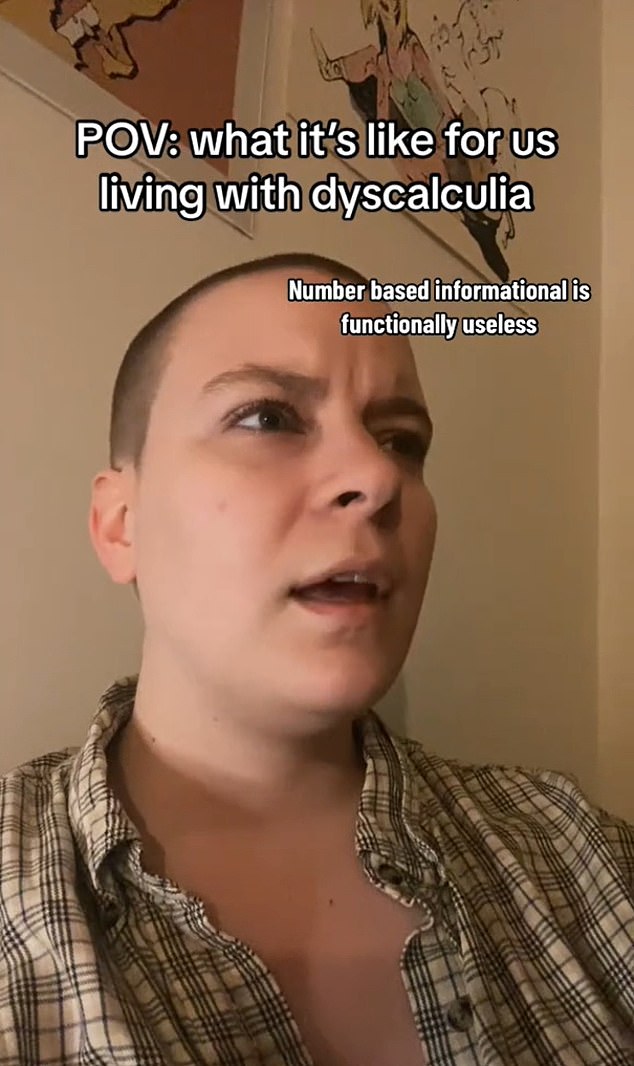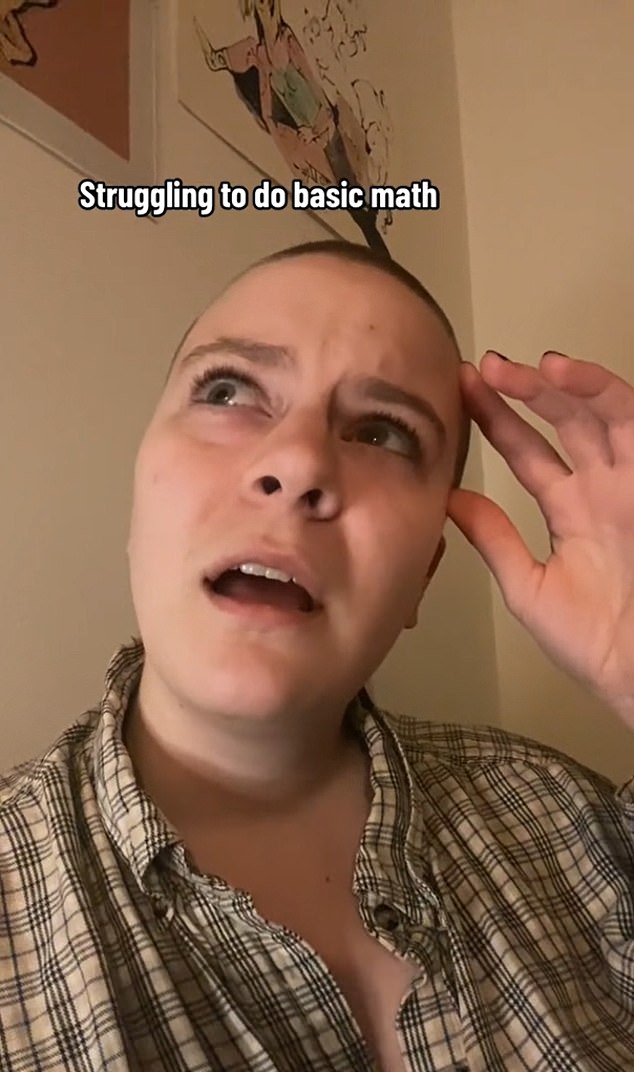What is dyscalculia? TikToker reveals what life is like with number blindness
Difficulty with math, losing track when counting and struggling with money are just some of the things that people with dyscalculia experience in everyday life.
According to the British Dyslexia Association, the little-known learning disability affects around 6% of people, with an astonishing four million in Britain, as reported by National Numeracy.
Research into its cause lags at least thirty years behind that of dyslexia. Because it is not talked about as much as other learning disabilities, many people may not realize they have dyslexia and go undiagnosed.
A TikToker from the US, who struggles with dyscalculia, decided to share his experiences to educate others.
The video of @thepillowfortsystem is titled 'POV: What it's like for us to live with dyscalculia' – it has been seen by over 600,000 people.

A TikToker struggling with dyscalculia decided to share his experiences to educate others
The first thing they listed is that “numbers-based information is functionally useless.”
For example, they acted out a scenario where they asked someone, “Hey, do you know how hot it is outside?”
The person would respond, “Yes, it's about 55 degrees,” but someone with dyscalculia may have difficulty realizing what that means: “So is that like cold, warm?”
Secondly, there's 'difficulty reading an analogue clock', as they revealed they had to count to tell the time: 'Okay, it's six and five, ten, fifteen, twenty… s*** “I've lost my place again.”
They continued: 'Constantly having to say things. Cash register work was a nightmare'.
If they said, “Okay, your change is this amount,” and the customer asked, “Oh, can I actually give you a quarter?”, they would feel confused.
Then they said, “Never knowing how much things are actually going to cost.”
They would play out a situation and say, 'Okay, before tax it's $15.25 and I have $25, so after tax it would be, I'll come back later when I have my debit card with me.'

They also revealed that everyday life often involves “difficulty with basic calculations”: “Wait, it's 350 grams more and it costs five dollars extra – is that a good deal?”
Dates can also prove to be difficult because life involves being 'incapable of remembering number-related things' and having to count the months to remember which number is associated with it.
For example, say “January, February, March, April” while counting on your fingers to realize that April is the fourth month.
They also revealed that everyday life often involves 'struggling to do basic math':
“Wait, it's 10 ounces more and it costs five dollars extra — is that a good deal?” I just buy the bigger one, it's usually cheaper to buy in bulk.'
Finally, they said they have “absolutely no concept of great values.”
He added, “So we were going to get an order for 15,000 pieces, but they sent us 50,000 pieces. Is that much more? I don't know, okay, all big numbers are the same'.
The TikTok proved recognizable to many, with viewers saying: 'Maybe I have dyscalculia' and 'I don't know if I have dyscalculia, but this video is very recognizable'.
Another said: 'I struggle a lot with it, but math is one of my best subjects. I just can't do it in my head'.
Meanwhile, others added: 'Growing up I HAD to use my fingers and write down the math no matter how simple it was' and 'My brain rejects numbers, they are a mystery to me'.
British Dyslexia defines dyscalculia as 'a specific and persistent difficulty in understanding numbers that can lead to a wide range of difficulties with mathematics'.
It is 'unexpected in relation to age, level of education and experience and occurs at all ages and abilities'.
The learning disability differs from math problems because of the “severity of problems with number sense, including subitization, symbolic and non-symbolic magnitude comparison, and ordering.”

British Dyslexia defines dyscalculia as 'a specific and persistent difficulty in understanding numbers that can lead to a wide range of problems with mathematics' (stock image)
If you think you have dyscalculia, you can request an informal assessment of math learning difficulties. The screening will determine if there are any features of dyscalculic behavior that require further investigation through a formal diagnostic assessment.
Neuroscientist from University College London, Professor Brian Butterworth, explains: 'There are many reasons to be bad at maths.
'Perhaps the most important thing is in which country you were educated, as shown in the most recent PISA report.
'Another factor is the education level of your parents, especially your mother. But dyscalculia is different. You can live in Singapore, which has by far the best math education system in the world, with well-educated parents, and still struggle to work with 9+6.
'This is because you were born with a poor sense of numbers.
'This is the ability to see the world numerically – for example the number of cups on the table – just as you see the world in colour. It is also very easy to test.
'Our Dyscalculia Screener tests how fast and accurate you are in determining the number of points on a screen. It also tests your math skills.
'If you are not good at arithmetic, but are good at the points test, you are not dyscalculic.

If you think you have dyscalculia, you can request an informal assessment of math learning difficulties
'We have evaluated this method on a large scale based on a five-year longitudinal study, which shows that poor arithmetic in kindergarten means poor arithmetic until the age of 11.
A study among 11,500 children aged 6 to 16 shows that the points test is an excellent predictor of arithmetic skills.
'Many other studies using similar methods yield the same results.
'Of course, most people with poor math skills haven't had a points test, so they live with their math problems without understanding why. They often think they are stupid because they have great difficulty doing what everyone else does easily.'
He advised: 'If you have this problem, it is a good idea to get tested by a qualified person, usually an educational psychologist with special training.'
Morwenna Stewart, neurodiversity expert at the International Coaching Federation, adds that dyscalculic people can take steps to help themselves or seek help from their employer.
She advises: 'Do research and gather as much information as possible. Make a list of how it affects you.
'If you feel comfortable with it, find someone at work you trust to talk about it. Many larger organizations have networks of disability staff, who are good sources of support and information.
'The government's Access to Work program can fund workplace coaching, equipment and other accommodations.
'A good coach can help you find strategies that work for you, so you can be your brilliant self!'
